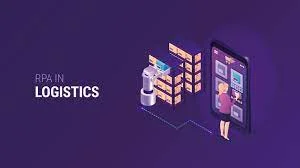By 2030, 50% of existing logistics and supply chain tasks could be automated (McKinsey).
According to Gartner, 75% of commercial supply chain management providers will deliver RPA in automation solutions by 2028.
40% of logistics expenses might be reduced as automation progresses along the supply chain.
So, when will you?

Robotic Process Automation involves the use of software robots to automate repetitive tasks, reducing human intervention and the potential for errors. In the logistics sector, where precision and speed are paramount, RPA has found its niche.
The Role of RPA in Logistics
Inventory Management and Tracking
RPA is adept at handling inventory-related tasks, from tracking stock levels to generating real-time reports. This ensures accurate stock predictions, preventing overstocking or stockouts.
Order Processing and Fulfillment
With RPA in automation, order processing becomes a breeze. Robots can validate orders, process invoices, and even prepare shipments, minimizing the chances of discrepancies and delays.
Warehouse Management
Warehouses are the heart of logistics, and RPA serves as a reliable heartbeat. Robots optimize storage, manage stock rotation, and facilitate efficient picking and packing.
Freight Management
RPA in automation simplifies freight documentation, tariff calculations, and customs compliance, making cross-border movement smoother while reducing the scope for manual errors.
Advantages of Incorporating RPA
RPA (Robotic Process Automation) can make work easier and faster by reducing the effort needed for certain tasks by 80%. This includes keeping track of supplies, checking stock levels, and creating reports. The good thing is, that RPA robots are very accurate and make zero mistakes when working with data.
By using application of automation, a company can spend less money on operations. This means that tasks get done quicker, so the current employees can do other important jobs, and the company doesn’t have to hire new people.
When RPA is used, employees are happier and more likely to stay in their jobs. This is because they can focus on important things like making decisions, coming up with new ideas, talking to other companies, and helping the business grow. This makes them feel good about their work.
Application of automation also helps improve customer service. Everything happens faster with RPA in automation, so customers can order things and get them quicker than before. Plus, customers like it when things are done well and without mistakes, thanks to RPA helping employees do their work better.

Conclusion
Incorporating Robotic Process Automation in logistics isn’t just a technological upgrade; it’s a paradigm shift. It enhances accuracy, accelerates operations, and paves the way for a more efficient and cost-effective future in the logistics industry.
FAQs About RPA in Logistics
Q1: What exactly is Robotic Process Automation?
Robotic Process Automation (RPA) involves using software robots to automate repetitive tasks that were previously performed by humans.
Q2: How does RPA improve accuracy in logistics?
RPA eliminates the risk of human error, ensuring precise execution of tasks like order processing, inventory management, and data entry.
Q3: Can RPA completely replace human workers in logistics?
No, RPA is designed to collaborate with human workers. While it automates repetitive tasks, human expertise is crucial for decision-making and managing exceptions.
Q4: What does the future hold for RPA in logistics?
The future is promising. We can expect RPA to become even more intelligent and adaptable, revolutionizing logistics operations.
Robotic Process Automation propelling the logistics industry toward a new era of efficiency, accuracy, and innovation. By harnessing the power of automation, logistics companies are streamlining processes, optimizing resources, and ultimately delivering a superior experience to customers. As application of automation continues to evolve, its transformative impact on logistics is only set to grow, paving the way for a future where operations are faster, smarter, and more responsive than ever before.
Still in doubt?
At Werq Labs, we offer a diverse range of RPA services, including RPA for Supply Chain and Logistics. Our team comprises exceptional automation specialists who excel in Robotic Process Automation within the realm of supply chain management, equipped with remarkable credentials and a profound comprehension of industry-specific procedures. With a proven track record in automating logistic processes, we stand prepared to elevate your company’s efficiency and output.
